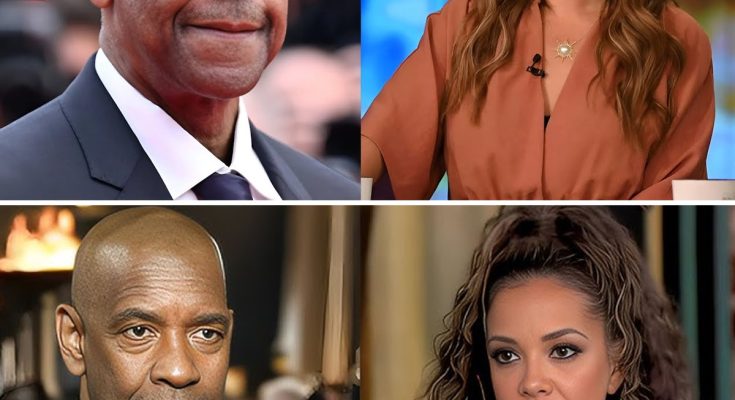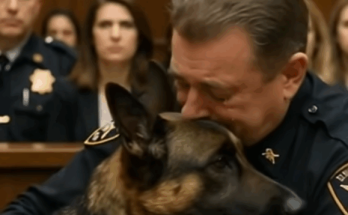It wasn’t a shout.
It wasn’t a scandal.
It was something far more powerful: a man of conviction choosing silence over spectacle.
On what began as a heartfelt Thursday morning interview on The View, Oscar-winner Denzel Washington stunned co-hosts and viewers alike—not with outrage, but with clarity. What was supposed to be a segment about healing, faith, and the power of storytelling turned, quietly but irrevocably, into one of the most talked-about exits in live television.
And it all started with one question.
A Reverent Beginning
The show opened with reverence. Whoopi Goldberg—longtime friend and admirer—introduced Washington not just as a legend of film and theater, but as “a man of faith, discipline, and stillness.” The applause was thunderous. For a moment, The View’s roundtable felt more like a cathedral than a TV set.
Denzel spoke softly, reflectively, about his latest project: a post-Civil War drama centered on reconciliation and the human spirit. “I didn’t make this film to entertain,” he said. “I made it to remember what grace looks like.”
The audience leaned in.
The Shift Begins
And then, Sunny Hostin spoke.
Her tone wasn’t hostile—but it was sharp.
“You speak about values. Faith. Forgiveness. But you don’t speak about politics. You stay out of it. Why?”
Denzel smiled gently. “Because politics is noisy. But truth? Truth is quiet. I align with that.”
The audience nodded. But Sunny pressed again, this time more directly: “Don’t you think silence, especially from someone of your influence, can be harmful?”
Denzel Responds — And Redefines the Moment
“I don’t believe in performative outrage,” he replied. “There’s a difference between silence and discernment. I speak where I’m called to. Not where I’m baited.”
The studio grew quiet.
But Sunny didn’t stop. “Some say staying out of the conversation protects your image.”
Denzel didn’t blink.
“You’re confusing dignity with branding. I don’t do this for applause. I don’t do this for safety. I do it for what’s right.”
At this point, Joy Behar tried to lighten the mood. Whoopi attempted to redirect. But the current was already shifting. Tension filled the air—not loud, but weighty.
The Final Question
Sunny leaned in one last time.
“Some viewers might feel your silence equals absence. That in the biggest cultural fights, you’re nowhere to be found.”
Denzel paused.
Then came the words that changed the tone of the room—and set the internet ablaze:
“You don’t know where I’ve used my voice. You only know where you didn’t hear it.”
No one spoke.
Not Joy. Not Sunny. Not Whoopi.
Because there was nothing left to say.
The Exit
Moments later, as cameras cut to commercial, Denzel quietly removed his microphone, nodded once to the co-hosts, and walked off set.
No dramatics. No complaint.
Just a man deciding—publicly, unmistakably—that he would not perform for interrogation.
When The View returned, his chair sat empty.
Whoopi offered a few careful words: “We respect Denzel’s choice.”
Sunny apologized. “It wasn’t meant to be confrontational,” she said, visibly shaken. “My job is to ask tough questions. But sometimes… maybe it’s also to listen.”
The Internet Reacts
The clip went viral within minutes.
But not for reasons viewers are used to.
There was no shouting match. No meltdown. Just a masterclass in grace, poise, and boundaries.
“This wasn’t a walkout,” one user posted. “It was a spiritual mic drop.”
“He didn’t storm out. He rose. And there’s a difference,” tweeted a civil rights advocate.
A fellow actor wrote, “I’ve never seen silence say so much.”
On TikTok, creators stitched together videos celebrating Denzel’s response, overlaying his words with gospel music, slow piano, and scenes from Malcolm X and Fences.
What Happens When a Man Refuses the Narrative
In an era where celebrities are expected to be loud, partisan, and constant, Denzel Washington offered something different: clarity without confrontation. He reminded viewers that conviction doesn’t require anger. That boundaries are not avoidance. And that sometimes, the most powerful act is to walk away with your head high.
When asked later on a red carpet if he regretted anything, Denzel simply said:
“No regrets. Not everything needs a sequel.”
The Deeper Impact
The moment was more than television. It was a cultural pause.
In a country where shouting over others often substitutes for truth, Denzel modeled a different kind of leadership—one that doesn’t sacrifice depth for headlines.
It sparked national conversation—not just about politics, but about civility. About how we treat those we disagree with. About how easily we confuse visibility with virtue.
And most importantly, it asked: Do we really want answers? Or are we just chasing content?
Final Word
The View will move on. Denzel will too. But that moment—those quiet 30 seconds where he said everything without raising his voice—will linger far longer than any panel debate or trending hashtag.
Because what Denzel Washington reminded the world that day was simple:
“I don’t debate monsters. I expose them. And when I’m done — I leave.”
And with that, he did.



